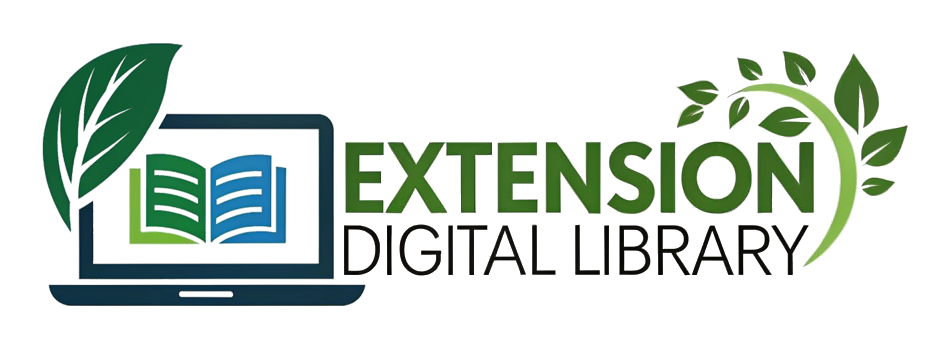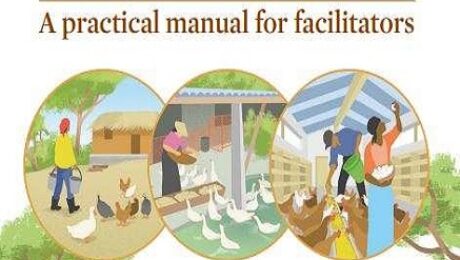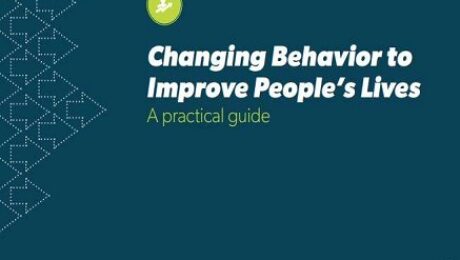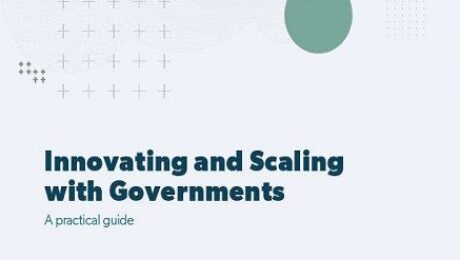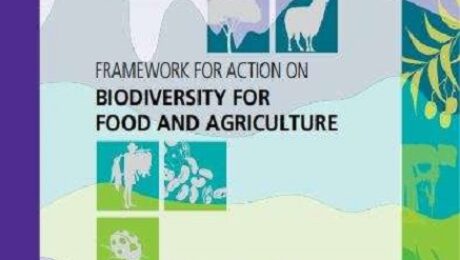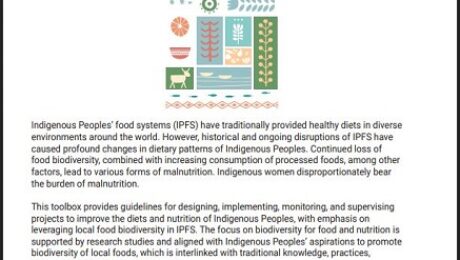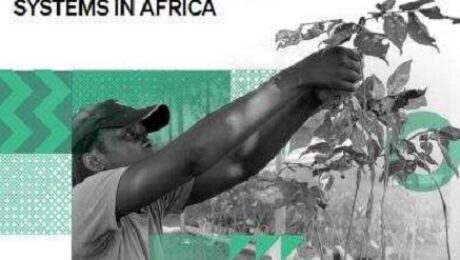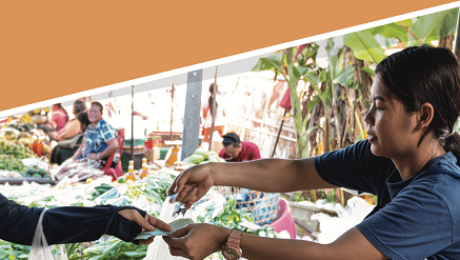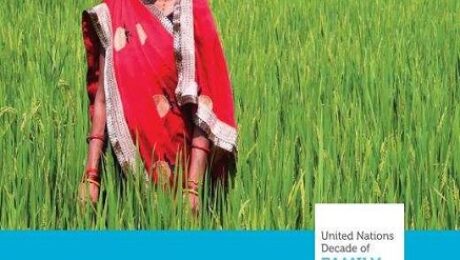Farmer field schools for family poultry producers
A growing number of poultry farmer field schools (FFS) are being implemented in developing countries by a wide range of actors. Experience over the past two decades has shown that good-quality facilitation and learning activities are key to the success and long-term sustainability of poultry FFS.
This manual provides practical information and activities that help facilitators establish and implement good-quality FFS. It focuses on working with women and men poultry producers to sustainably enhance production, productivity and marketing in any family poultry production system, ranging from extensive to small-scale intensified, in line with producers’ aspirations and local conditions. The first module of the manual covers poultry FFS establishment and learning activities, and the second provides “need-to-know” information on poultry production and health and FFS facilitation.
- Published in GUIDE/TOOLS/MANUALS
Changing Behavior to Improve People’s Lives- A practical guide
Many, if not most, technological solutions ultimately depend on individual behavior. Energy-efficient hybrids or electric cars are of little use if drivers don’t buy them. The birth control pill, invented in the 1950s, provided a breakthrough technological solution for providing effective contraception to hundreds of millions of people. But effective use of the pill requires that it be taken for three weeks with a break for the fourth. For many users, this regimen, with its irregular routine, was more difficult to follow than taking the pill every day. The behaviorally informed solution was to include a fourth week of placebos.1 (You might think that we have ignored a third broad category of markets and other systems. But these too involve a mixture of something akin to technology—the policy intervention in changing a system—and individuals’ behavioral responses to it.)
Professionals, no less than the rest of us, are participant-observers in the social world. Although many of us have strong intuitions about the levers for changing behavior, our intuitions are often wrong. Some important developments in the past decades have helped identify common intuitive errors and build behavioral strategies based on empirical evidence.
- Published in GUIDE/TOOLS/MANUALS
Innovating and Scaling with Governments
How can we ensure anti-poverty programs are doing the most good for those who need them? One important step is to invest in scaling successful innovations within these programs. With government-led poverty alleviation programs reaching millions of people worldwide, these programs can model how cost-effective solutions can make significant strides to end poverty. However, innovating and scaling interventions within these programs often bring challenges, particularly when bureaucratic processes are not designed to promote it.
ideas42 has spent the last decade working with 10 governments across sub-Saharan Africa to design and embed behavioral interventions into their cash transfer programs. We designed these interventions so cash transfer programs could better help recipients set and reach their financial goals, such as saving and income generation, as well as human development goals, such as education, nutrition, and child development (see Box 1). Through consistent collaboration and deep commitment to the cause, our light-touch behavioral interventions have reached over half a million cash transfer recipients to date. In this toolkit, we draw from our experience in scaling these interventions with governments to provide actionable tips on how to successfully partner with governments to create and scale innovative solutions to some of the world’s most pressing problems.
- Published in GUIDE/TOOLS/MANUALS
Framework for Action on Biodiversity for Food and Agriculture
The Framework for Action on Biodiversity for Food and Agriculture was endorsed by the FAO Council in 2021. It contains more than 50 individual actions grouped into three strategic priority areas: characterization, assessment and monitoring; management (sustainable use and conservation); and institutional frameworks. It was developed in response to the country-driven report on The State of the World’s Biodiversity for Food and Agriculture.
- Published in GUIDE/TOOLS/MANUALS
Sustainable and resilient Indigenous Peoples’ Food Systems for improved nutrition
Disruptions in Indigenous Peoples’ food systems (IPFS) have caused profound changes in their dietary patterns. Loss of food biodiversity and increased consumption of processed foods lead to malnutrition, with indigenous women disproportionately affected.
This toolbox provides guidelines on how to design and assess food biodiversity and dietary diversity projects with local communities, with the aim of improving the diets and nutrition of Indigenous Peoples. It focuses on local food biodiversity, leveraging Indigenous Peoples’ knowledge, practices, languages, culture, and environment.
- Published in GUIDE/TOOLS/MANUALS, NUTRITION
Research Series 71: Urbanizing food systems: exploring opportunities for rural transformation
This paper shows that while anticipated increases in food demand by 2050 can largely be met regionally, potential yield increases or diversification will not contribute automatically to inclusive rural transformation. Instead, urbanization may potentially increase rural inequality and poverty. Smallholder farmers located close to expanding cities risk losing their land to urbanization, while people living in rural areas far from growing urban food markets who lack access to inputs, information, and markets are at risk of losing out.
For all rural food system actors to profit from growing urban markets, the patterns of urbanization, the quality of rural-urban linkages, and the functionality of secondary towns are crucial. Physical and communicative proximity to urban markets means better access to finance, inputs, information, and services. Furthermore, off-farm employment opportunities can arise in the developing value chains. To realise the opportunities, this paper identifies a range of social, physical, spatial, economic and institutional conditions that enable inclusive rural transformation.
- Published in GUIDE/TOOLS/MANUALS
Mapping of territorial markets
Malnutrition in all its forms (undernutrition, micronutrient deficiency, overweight and obesity) is a major global challenge, and improving nutrition is a key priority for global development, as recognized in the UN Decade of Action on Nutrition (2016–2025) and the 2030 Agenda for Sustainable Development. In this context, ensuring availability, physical accessibility and affordability of healthy and nutritious food at territorial level is crucial to ensure the achievement of the Sustainable Development Goals (SDGs). In many developing countries, territorial markets are key retail outlets for fruits and vegetables, but also for animal source foods and staple foods. Besides the relevance, data concerning the availability of the different food groups and characteristics of food retailers and consumers in territorial markets are seldom considered in national data collection systems. This publication presents a structured methodology and a series of guidelines for mapping territorial markets, as developed by the Food and Agriculture Organization of the United Nations (FAO), along with representatives of producer organizations and academics.
- Published in GUIDE/TOOLS/MANUALS, NUTRITION
Investment guidelines for youth in agrifood systems in Africa
The Investment guidelines for youth in agrifood systems in Africa, developed jointly by FAO and the African Union Commission (AUC) through a multi-stakeholder and participatory process, highlight the importance of youth as change agents and key stakeholders contributing to sustainable agrifood systems. The guidelines aim to accelerate investments in and by youth in agrifood systems by providing practical guidance – including tools and examples – to design, develop, implement, monitor and evaluate youth-focused and youth-sensitive investment programmes and to engage youth fully as partners in the entire process.
The guidelines were prepared with the support of the AUC and FAO Technical Cooperation Programme (TCP) “Partnership to Support AU’s Strategies on Social Protection, School Feeding and Rural Youth Employment” of the FAO Regional Office for Africa (RAF) and from the Investment Centre (CFI). This publication is part of the Investment Toolkits series under the FAO Investment Centre’s Knowledge for Investment (K4I) programme.
- Published in GUIDE/TOOLS/MANUALS
Agricultural trade in the Global – An overview of trends in performance, vulnerabilities, and policy frameworks
South-South Cooperation (SSC) is increasingly recognized as an effective instrument for catalyzing economic development by fostering the exchange of innovation and good practices, and expanding market opportunities across countries with a similar level of development and shared development objectives, such as those reflected in the Sustainable Development Goals (SDGs). Key to this economic cooperation are trade and investment relationships among South countries. The importance of South countries in global agrifood markets and trade has been increasing over the last two decades, with growth in their participation, as both exporters and importers, having outpaced that of North countries. Agricultural productivity growth has fueled expansion in the production of some products, while population growth and urbanization, rapid economic growth and increasing per capita incomes have contributed to growing demand for diverse food products.
- Published in GUIDE/TOOLS/MANUALS, VALUE CHAIN / MARKETS
UNDFF Regional Action Plan for strengthening family farming in South Asia 2021–2028
The Regional Action Plan for strengthening family farming in South Asia has been elaborated through a participatory and multi-stakeholder approach in the framework of the UN Decade of Family Farming and in close collaboration with SAARC Agriculture Center, the Asia Farmer Association for Sustainable Rural Development and the International Cooperative Alliance – Asia Pacific. Consultations with farmers’ organizations, cooperatives and other relevant stakeholders at country level first helped identifying and prioritizing key interventions for the region along the seven pillars of the Global Action Plan. These initial inputs then contributed to the overall drafting of the contextualized pillars led by recognized experts from the region. The draft pillars were presented during a first regional virtual consultation on UN Decade of Family Farming: Formulating Strategies and Action Plan to Strengthen Smallholder Family Farmers in South Asia held on the 5–6 November 2020. A follow up regional consultation meeting on review and finalization of the Regional Action Plan for strengthening family farming in South Asia was then organized on 29 July 2021. The objective was to present, discuss and validate the draft Regional Action Plan for strengthening family farming in South Asia. This Regional Action Plan aims at facilitating and accelerating the process of developing national action plans through inclusive multi-stakeholder processes, not only putting family farmers at the centre but recognizing them as critical partners.
- Published in GUIDE/TOOLS/MANUALS, PRIVATE SECTOR EXTENSION /PPP
